新概念英语第一册Lesson 117
《新概念英语》第一册——Lesson 117

《新概念英语》第一册——Lesson 117 &118
1.词汇
(1)coin(n. 硬币), mouth(n. 嘴), swallow(v. 吞下), later(adv.
后来), toilet(n. 厕所,盥洗室)
(2)补充:mouthful(n. 满嘴的)
2.短语及固定搭配
dining room 餐厅
look for 寻找
family tree 家谱
put on 穿上(衣服)
have a seat 就座
3.语言点
(1)later that morning
later是副词late的比较级。
(2)any change
change是多义词,既有“零钱”的意思,也有“变化”的以上。
在这里既可以指“硬币”,也可以指“情况的变化”。
这是英语里的“双关”修辞法。
4.语法
(1)过去进行时:表示过去某个时间正在进行的动作。
如:When my husband was going into the dining r oom this morning …; While we were having breakfast…等。
(2)同位语:紧跟在一个名词或代词后,进一步说明前面名词或代词是谁或什么东西的名词或代词,叫同位语。
如:them all; our little boy, Tommy;
put them both…; we both…等。
(3)过去完成时:用来表示两个动作中,发生在前的那个动作。
如:Tommy had already swallowed them!“咽下硬币”这个动作发生在夫妇俩能把硬币从Tommy手中抢过来之前。
新概念英语第一册Lesson 117 Tommy’s breakfast

When my husband was going into the dining-room this morning , he dropped some coins on the floor.There were coins everywhere. We looked for them, but we could not find them all.While we were having breakfast, our little boy, Tommy, found two small coins on the floor.He put them both into his mouth. We both tried to get the coins, but it was too late. Tommy had already swallowed them!Later that morning, when I was doing the housework, my husband telephoned me from the office.“How’s Tommy?” he asked.“I don’t know,” I answered, “Tommy’s been to the lavatory three times this morning, but I haven’t had any change yet!”New Word and expressions 生词与短语dinning room饭厅coinn. 硬币mouthn. 嘴swallowv. 吞下lateradv. 后来toiletn. 厕所,盥洗室本文参考译文今天早晨我丈夫走进饭厅时,把一些硬币掉在地上了。
到处都是硬币。
我们虽然找了,但没有把它们全部找到。
正当我们吃早饭时,我们的小男孩汤米在地上找到两枚小硬币。
他把这两枚硬币全都放进嘴里。
新概念英语第一册自学笔记含课后练习答案:Lesson 117-118

新概念英语第一册自学笔记含课后练习答案:Lesson117-118新概念英语第一册117-118课课文重难点详解 further notes onthe text1.look for,寻找(强调动作过程);find,找到(强调寻找的结果)。
2.tommy had already swallowed them! 汤米已经把硬币咽了下去!句中用了过去完成时形式 had swallowed。
过去完成时用来表示过去两个动作中发生在前的那个动作。
显然,句中咽下硬币的动作发生在夫妇俩能够把硬币从汤米手中抢过来之前。
3.later that morning,那天上午的晚些时候。
later是副词late的比较级。
4.any changechange是个多义词,既有“零钱”的意思,也有“变化”的意思。
此处既可指“硬币”;也可指“情况的变化”。
这是双关(pun /p)n/)修辞法。
新概念英语第一册117-118课语法知识点 grammar in use过去实行时构成: be的过去式+现在分词。
过去实行时表示过去某时正在实行的情况或动作。
过去实行时和一般过去时经常在同一个句子里使用。
过去实行时表示过去正在实行的情况或动作,一般过去时则表示比较短暂的动作或事件。
过去实行时的时间状语从句一般由when,while及(just)as等来引导,说明主句中动作发生时的背景。
此外,可用 while或 at the time等强调同时实行的两种或几种动作。
请看例句:when i was doing the housework, my husband telephoned mefrom the office.当我正在干家务时,我丈夫从办公室打电话给我。
while i was listening to the stereo, my mother came into the room.我正在听立体声节目时,我母亲进房间了。
just as she was cleaning her shoes, george knocked at the door.她正在擦鞋时,乔治敲门了。
Lesson117(课件)新概念英语第一册
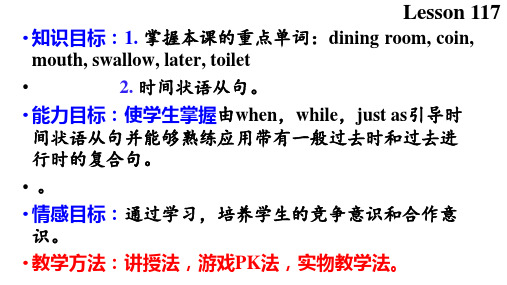
翻译下列句子。 • 1. 当我到达时,她正在做饭。 • When I __a_r_ri_v_e_d_, she_w_a_s___ _c_o_o_k_in_g_ a meal. • 4. 当我读书时,我妈妈正在做饭。 • _W__h_i_le____I was reading , • my mother __w_a_s_____ __c_o_o_k_i_n_g_____.
• A. him B. his
C. himself D. it
• (A) 4. Have you ever _______ Shenzhen?
• A. been to B. gone to C. went to
D. gone in
• (C ) 1. When he _______ I _______ a bath.
do housework
phone me from the office
一、选择题
• (C) 1. I _______ my pen everywhere but I couldn’t _______ it.
• A. looked for, found
B. found, looked for
• C. looked for, find
•。
• 情感目标:通过学习,培养学生的竞争意识实物教学法。
翻译下列句子。 • 1. 当我到达时,她正在做饭。 • When I ________, she______ _______ a meal. • 2. 当我读书时,我妈妈正在做饭。 • _________I was reading , • my mother _________ _____________.
While ... have breakfast, Tommy, find two small coins
新概念英语第一册Lesson117~122课文注释

新概念英语第一册Lesson117~122课文注释新概念英语第一册Lesson117~118课文注释1 在英文中表示过去某时正在进行的动作,要用过去进行时。
与现在进行时相比,过去进行时的区别就在于要用be 的过去式。
过去进行时的例子有:When my husband was going into the dining room this morning…;While we were having breakfast…等。
2 them all, all用来强调每一个硬币。
从语法上来讲,all是them的同位语。
紧跟在一个名词或代词后,进一步说明前面名词或代词是谁或什么东西的名词或代词,叫同位语。
3 our little boy, Tommy.Tommy是boy的同位语。
4 put them both…both是them的同位语。
5 we both...both是we的同位语。
6 Tommy had already swallowed them!句中用了过去完成时。
过去完成时用来表示两个动作中,发生在前的那个动作。
显然,句中“咽下硬币”的动作发生在夫妇俩能够把硬币从汤米手中抢过来之前。
7 later that morning 那天上午的晚些时候。
later是副词late的比较级。
8 any changechange是个多义词,既有“零钱”的意思,也有“变化”的意思。
此处既可指“硬币”,亦可指“情况的变化”。
这是“双关”修辞法。
新概念英语第一册Lesson119~120课文注释1 as quickly as they could是状语,修饰ran away。
第1个as是副词,第2个as是连词.引导比较状语从句。
could后省略了run,是“能跑多快就跑多快”的意思。
2 What’s up?干什么?有什么事?3 he calledhe指parrot。
英语中,动物有时用he或she代替,是“拟人”的写法。
新概念英语第一册Lesson117-118笔记(语法点+配套练习+答案)

put ... into ...
把...放到
have/has been to
曾去过某地
四、语法解析
1.现在进行时:说话此刻正在发生
结构:be (am/is/are) + v.ing
时间标志词:Look! Listen! now, at the moment
练习:
1.One of themis taking(take) photos for us now.
11.Didyoufinish(finish) your homework yesterday?
12.Her motherdidn’t give(not give) the girl any present.
13.When hewent(go) back to England, hewass(be) very tired.
The childrenwereallhappy.
Bothof the twins wanted to go to the theatre.
Allof my classmates are invited to my party.
three times三次
现在完成时的标志词
twice两次
once一次
have/has been to去过某地,已回
have/has gone to去了某地,未回
My father isn't at home, hehas gone toBeijing.
Mr Wang isn't here.Hehas gone toQingdao.
My fatherhas been toBeijing twice.
Ihaveneverbeen tothe Great Wall.
新概念英语第一册第117课Lesson117课文单词知识点

Lesson117When my husband was going into the dining room this morning, he dropped some coins on the floor.There were coins everywhere. We looked for them, but we could not find them all.While we were having breakfast, our little boy, Tommy, found two small coins on the floor.He put them both into his mouth. We both tried to get the coins, but it was too late. Tommy had already swallowed them!Late that morning, when I was doing the housework, my husband phoned me from the office.'How's Tommy?' he asked. 'I don't know,' I answered, 'Tommy's been to the toilet three times this morning, but I haven't had any change yet!' 今天早晨我丈夫走进饭厅时,把一些硬币掉在地上了。
到处都是硬币。
我们虽然找了,但没有把它们全部找到。
正当我们吃早饭时,我们的小男孩汤米在地上找到两枚小硬币。
他把这两枚硬币全都放进嘴里。
我们俩都试图把这两枚硬币拿出来,但太迟了。
汤米已经把硬币咽了下去!那天下午的晚些时候,当我正做家务时,我丈夫从办公室打来电话。
新概念英语第一册课文翻译及学习笔记Lesson117知识分享

新概念英语第一册课文翻译及学习笔记Lesson117【课文】When my husband was going into the dining room this morning, he dropped some coins on the floor.There were coins everywhere. We looked for them, but we could not find them all.While we were having breakfast, our little boy, Tommy, found two small coins on the floor.He put them both into his mouth. We both tried to get the coins, but it was too late. Tommy had already swallowed them!Late that morning, when I was doing the housework, my husband phoned me from the office.'How's Tommy?' he asked. 'I don't know,' I answered,'Tommy's been to the toilet three times this morning, but I haven't had any change yet!'【课文翻译】今天早晨我丈夫走进饭厅时,把一些硬币掉在地上了。
到处都是硬币。
我们虽然找了,但没有把它们全部找到。
正当我们吃早饭时,我们的小男孩汤米在地上找到两枚小硬币。
他把这两枚硬币全都放进嘴里。
我们俩都试图把这两枚硬币拿出来,但太迟了。
汤米已经把硬币咽了下去!那天下午的晚些时候,当我正做家务时,我丈夫从办公室打来电话。
新概念英语第一册随堂练习— Lesson117~118(有答案)
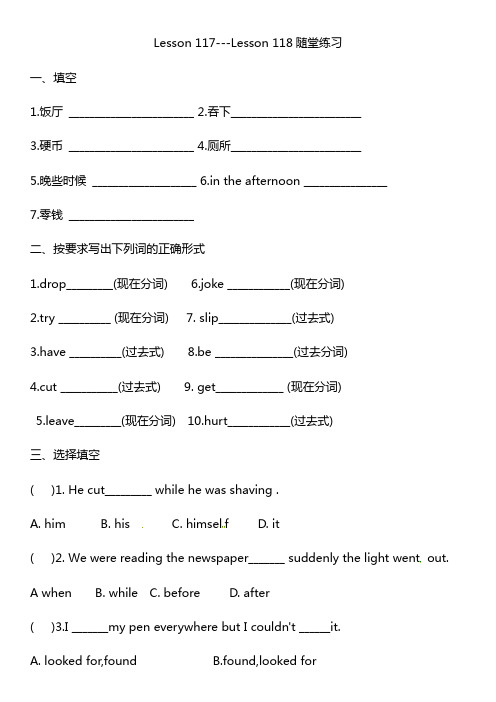
Lesson 117---Lesson 118随堂练习一、填空1.饭厅________________________2.吞下_________________________3.硬币________________________4.厕所_________________________5.晚些时候____________________6.in the afternoon ________________7.零钱________________________二、按要求写出下列词的正确形式1.drop_________(现在分词) 6.joke ____________(现在分词)2.try __________ (现在分词) 7. slip______________(过去式)3.have __________(过去式) 8.be _______________(过去分词)4.cut ___________(过去式) 9. get_____________ (现在分词)5.leave_________(现在分词) 10.hurt____________(过去式)三、选择填空( )1. He cut_________ while he was shaving .A. himB. hisC. himsel fD. it( )2. We were reading the newspaper_______ suddenly the light went out.A when B. while C. before D. after( )3.I _______my pen everywhere but I couldn't ______it.A. looked for,foundB.found,looked forC. looked for,findD. find, look for( )4. Someone knocked________the door when I was watching TV.A at B.in C.for D. to( )5.While she __________TV in the sitting room, the bell___________.A.watches, ringsB. is watching: rangC. was watching, rangD.watched,was ringing( )6. He often phones me________his office.A.inB.atC. forD. from( )7. She_______herself while she________off the bus.A. hurt; was gettingB.hurts;was gettingC. hurt; is gettingD. hurts; is getting( )8.---Is there________in the bag?---No, there is________.A, something; anything B. anything;nothingC.anything;somethingD. something;nothing( )9. When he_______,I________a bath.A. arriving; was havingB. arrived; am havingC. arrived; was havingD. arrives; was having( )10. Have you ever_______Shenzhen?A. been toB. gone toC. went toD.gone in四、连词成句1. opening, I, as, just, was, the, rang, door, phone ,the(.)_______________________________________________________________2.already, we, to, been, three, have, times, Shanghai(.)________________________________________________________________3.cooking, while, I, dinner, the, was, he, working, was, garden, the, in(.) ________________________________________________________________4. doing, you, what, were, watching, when, was , I,TV(?)________________________________________________________________五、汉译英1.他把两枚硬币全都放进了嘴里。
新概念英语第一册第117-118课课件(全).ppt

• A. The other B. The others C. Another
D. Others
• 8. This is not the only answer to the question. There are _____.
• A. the others B. others C. another
D. the other
• 9. Please give me ____ chance.
• A. other B. the other C. another
D. the others
• 10. He was a wonderful teacher. Everyone agreed it would be hard to find ____ like him.
• 4. Jim! _________ is waiting for you at the school gate.
• 5. In spring, _________ begins to grow.
• 6. There is _________ knocking at the door. Please go and see who it is.
D. Another
• 3. This cake is delicious! Can I have ______ piece, please?
• A. other B. another
C. others
D. the other
• 4. Where are _____ boys?
• A. the other B. the others C. others
practice
1.There’s no _____ way to do it.
新概念第一册课文翻译及知识点【Lesson115、117、119】

【导语】新概念英语作为⼀套世界闻名的英语教程,以其全新的教学理念,有趣的课⽂内容和全⾯的技能训练,深受⼴⼤英语学习者的欢迎和喜爱。
为了⽅便同学们的学习,为⼤家整理了⾯的新概念第⼀册课⽂翻译及学习笔记,希望为⼤家的新概念英语学习提供帮助!Lesson115 【课⽂】 HELEN: Isn't there anyone at home? JIM: I'll knock again, Helen. Everything's very quiet. I'm sure there's no one at home. HELEN: But that's impossible. Carol and Tom invited us to lunch. Look through the window. HELEN: Can you see anything? JIM: Nothing at all. HELEN: Let's try the back door. JIM: Look! Everyone's in the garden. CAROL: Hello, Helen. Hello, Jim. TOM: Everybody wants to have lunch in the garden. It's nice and warm out here. CAROL: Come and have something to drink. JIM: Thanks, Carol. May I have a glass of beer please? CAROL: Beer? There's none left. You can have some lemonade. JIM: Lemonade! TOM: Don't believe her, Jim. She's only joking. Have some beer! 【课⽂翻译】 海伦:家⾥没有⼈吗? 吉姆:海伦,我再敲⼀次。
新概念英语第一册课后题及答案:Lesson117-118
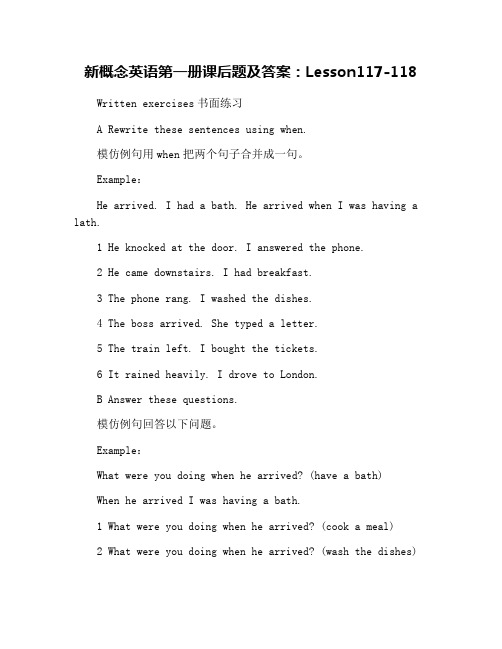
新概念英语第一册课后题及答案:Lesson117-118 Written exercises书面练习A Rewrite these sentences using when.模仿例句用when把两个句子合并成一句。
Example:He arrived. I had a bath. He arrived when I was having a lath.1 He knocked at the door. I answered the phone.2 He came downstairs. I had breakfast.3 The phone rang. I washed the dishes.4 The boss arrived. She typed a letter.5 The train left. I bought the tickets.6 It rained heavily. I drove to London.B Answer these questions.模仿例句回答以下问题。
Example:What were you doing when he arrived? (have a bath)When he arrived I was having a bath.1 What were you doing when he arrived? (cook a meal)2 What were you doing when he arrived? (wash the dishes)3 What were you doing when he arrived? (work in the garden)4 What were you doing when he arrived? (type letters)5 What were you doing when he arrived? (shave)6 What were you doing when he arrived? (boil the milk)7 What were you doing when he arrived? (phone my sister)8 What were you doing when he arrived? (dust the bedroom)C Answer these questions.模仿例句回答以下问题。
新概念英语一册课后练习答案Lessons 117-118

新概念英语第一册117-118课词汇学习 Word studyswallow v.(1)吞下,咽下:Tommy had swallowed the coins.汤米把硬币吞下去了。
(2)抑制,使不流露:I tried hard to swallow my doubts.我强忍着不露出怀疑的神色。
She swallowed a smile and sat there still.她忍住没笑,静静地坐在那里。
(3)吞并;侵吞:Our company was swallowed up by an American company last year.我们公司去年被一家美国公司吞并了。
Nazi Germany nearly swallowed up the whole Europe in World War Ⅱ. 第二次世界大战中,纳粹德国几乎吞并了整个欧洲。
ring v.(1)鸣响;发出清脆的响声:When I was opening the front door, the telephone rang.我正开前门时,电话铃响了。
Yesterday morning, my alarm clock didn't ring at 7 o'clock as usual. 昨天早上,我的闹钟没像往常那样在7点钟闹。
(2)打电话;按铃:You said you were going to ring me last night, but you didn't.你说过你昨晚会给我打电话的,然而你并没有打。
Somebody is ringing the doorbell.有人在按门铃。
新概念英语第一册118课课后练习答案 Key to written exercises Lesson 118A1 He knocked at the door when I was answering the phone.2 He came downstairs when I was having breakfast.3 The phone rang when I was washing the dishes.4 The boss arrived when she was typing a letter.5 The train left when I was buying the tickets.6 It rained heavily when I was driving to London.B1 When he arrived I was cooking a meal.2 When he arrived I was washing the dishes.3 When he arrived I was working in the garden.4 When he arrived I was typing letters.5 When he arrived I was shaving.6 When he arrived I was boiling the milk.7 When he arrived I was phoning my sister.8 When he arrived I was dusting the bedroom.C1 While I was cooking the dinner, he was having a wash.2 While I was cooking the dinner ,he was watching television.3 While I was cooking the dinner, he was cleaning his shoes.4 While I was cooking the dinner, he was listening to the radio.5 While I was cooking the dinner, he was changing his suit.6 While I was cooking the dinner, he was sitting in the dining room.7 While I was cooking the dinner, he was reading the paper.8 While I was cooking the dinner, he was driving home from work.。
新概念英语一册Lesson 117 Jimmy's breakfast
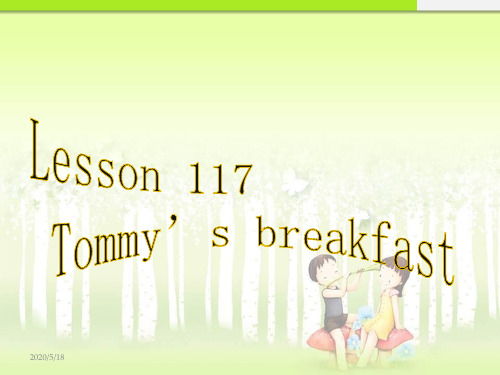
2,There were coins everywhere. We looked for them, but we could not find them all. ① everywhere 到处都是 ②look for 寻找,强调动作。 Find 找到,强调结果 例:I looked for my exercise book everywhere this morning, but I couldn’t find it. listen / hear look at / see
③ change n. 零钱,即指前面的coin There's your change. — Thanks very much. v. 变化,改变 In fall the leaves change from green to brown.
T: Did the two of you try to get the coins? S: Yes, we both tried to get the coins. miss the train, knock at the door, meet him at the station, make appointment, hurt yourselves, get off the bus, leave early, slip, find all this money.
花露水
toilet water
Key words and expressions
ring ring-rang-rung v. 打电话 I'll ring you back in about half an hour. n. 响铃 Be quick. The bell is ringing. n. 电话 We'll give him a ring as soon as we get back 戒指 wedding ring
(完整版)新概念英语第一册Lesson117-118练习(无答案)
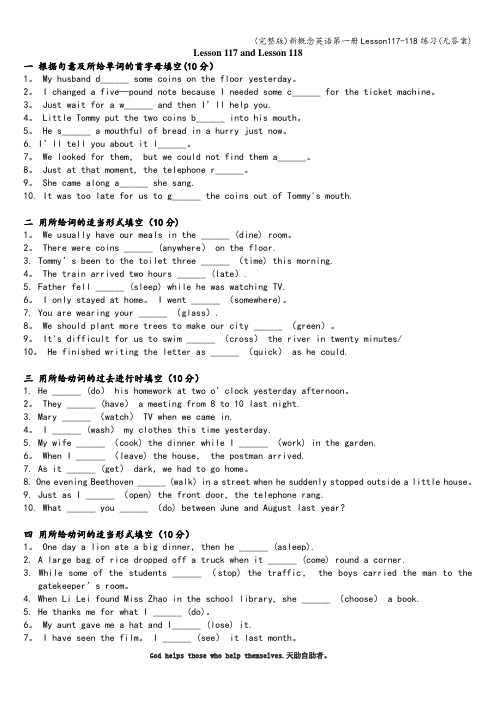
Lesson 117 and Lesson 118一根据句意及所给单词的首字母填空(10分)1。
My husband d______ some coins on the floor yesterday。
2。
I changed a five—pound note because I needed some c______ for the ticket machine。
3。
Just wait for a w______ and then I’ll help you.4。
Little Tommy put the two coins b______ into his mouth。
5。
He s______ a mouthful of bread in a hurry just now。
6. I’ll tell you about it l______。
7。
We looked for them, but we could not find them a______。
8。
Just at that moment, the telephone r______。
9。
She came along a______ she sang.10. It was too late for us to g______ the coins out of Tommy's mouth.二用所给词的适当形式填空(10分)1。
We usually have our meals in the ______ (dine) room。
2。
There were coins ______ (anywhere) on the floor.3. Tommy’s been to the toilet three ______ (time) this morning.4。
The train arrived two hours ______ (late).5. Father fell ______ (sleep) while he was watching TV.6。
新概念英语第一册Lesson-117-118

Lesson 117 - Tommy’s breakfast & Lesson 118 - What were you doing?知识点:1、When my husband was going into the dining room this morning, he dropped some coins on the floor.句型:当某事发生的时候,发生了某事。
用when引导的时间状语从句。
过去进行时:强调在过去某个时间正在发生的事。
was/were + doing2、There were coins everywhere.【回顾Lesson 115】复合不定代词。
3、We looked for them, but we could not find them all.look for 寻找,强调动作。
look是不及物动词。
find 找到,强调结果。
find是及物动词。
例句:He looked for his pen everywhere, but he couldn’t find it.这里的all放在代词them的后面,作them的同位语,补充说明。
them all = all of them 同位语用来表示其具体内容。
例句:We all like this movie. = All of us like this movie.4、While we were having breakfast, our little boy, Tommy, found two small coins on the floor. 句型:在某事发生的同时,发生了某事。
用while引导的时间状语从句。
例句:While my father was watching TV, my mother was cooking这里的, Tommy, 是our little boy的同位语,补充说明。
5、He put them both into his mouth.both 两者都。
新概念英语口语第一册Lesson117HaveBreakfast吃早餐

经典对话对话 1 (A=Helen B=Waiter)A:What do you recommend?A:有什么好菜推荐⼀下吗?B:We have a daily chef's special fried chicken.B:有每⽈⼤厨特餐的炸鸡。
A:What side dish comes with the special?A:包括什么配菜吗?B:A side salad and your choice of a baked potato or steamed rice.B:有沙拉,你还可以选择烤⼟⾖或是⽶饭。
A:I will have the special with a salad and the potato.A:我来份特餐,还有沙拉和⼟⾖。
B:Anything else?B:还要别的吗?A:Yes,a glass of iced water.A:是的,⼀杯冰⽔。
B:OK.B:好的。
对话 2 (A=Emily B=Lucy)A:I'm famished.A:我要饿死了。
B:Me too. It's my treat. What are you in the mood for?B:我也是,今天我请客,你想吃什么?A:I think I want two steaks and a glass of milk. I can wolf down an elephant.A:我要两份⽜排,⼀杯⽜奶。
我能呑掉⼀头⼤象。
B:You really have a wolf in your stomach. I'd like one steak,a glass of orange juice and two doughnuts. B:你胃⼝是够⼤的,我要⼀份⽜排、⼀杯橙汁、两个炸饼圈。
A:Ah,this steak is great. It really fills the bill.A:啊,⽜排好棒啊,正合我的胃⼝。
- 1、下载文档前请自行甄别文档内容的完整性,平台不提供额外的编辑、内容补充、找答案等附加服务。
- 2、"仅部分预览"的文档,不可在线预览部分如存在完整性等问题,可反馈申请退款(可完整预览的文档不适用该条件!)。
- 3、如文档侵犯您的权益,请联系客服反馈,我们会尽快为您处理(人工客服工作时间:9:00-18:30)。
5. look for sth./sb. 寻找某物/某人 find 找到find 强调“找”的结果,而look for 强 调“找”的过程 I looked for my bike and I found it in the backyard. They were looking for the boy. • While we were having breakfast, our little boy, Tommy, found two small coins on the floor. He put them both into his mouth. 6. Our little boy, Tommy……/He put them both…… ① 一个名词对另一个名词或代词进行修饰,限定 或说明,这个名词就是同位语。同位语与被它 限定的词常常紧挨在一起。 Mr. James, our teacher, is a very nice person. He told me that his brother John is a doctor.
• 常用时间状语 When, while, a moment ago, from nine to ten last evening, at that time • when既指时间点,也可指一段时间, while只指 一段时间,因此when引导的时间状语从句中的 动词可以是终止性动词,也可以是延续性动词, 而while从句中的动词必须是延续性动词。 I was having dinner when he came in. He came in when I was having dinner While I was having dinner, he came in. Mom was reading while Dad was watching TV.
•
We both tried to get the coins, but it was too late. Tommy had already swallowed them! 9. 回忆too, enough的用法。 主语+be too+adj. for sb. (to do sth.) The text was too difficult for me. 主语+be+adj. enough for sb. (to do sth.) +be+adj. The house was cheap enough for me. 10. swallow v./n. 吞, 咽; 一大口/燕子 谚语:One swallow does not make a summer. 一只燕子成不了夏天。(不能以 偏概全)
2. Penny __ dinner when she cut her fingers. A. had B. having C. was having D. is having KEY: C
3. While we ___ (wait) for the bus, a girl ___(run) up to us. 4. I ___ (telephone) a friend when Bob ___ (come) in. 5. While mother ___(put) Cathy to bed, the door bell ___ (ring). 6. Jane___(wait) for me when I___(arrive). 7. Mike and I___(play) basketball at that time yesterday afternoon.
② 除了名词之外,数词,代词等也可以做 同位语。 Jane, 16, is very clever. You can believe in us two. ③ 同位语分为限定性和非限定性的同位语。 限定性同位语与前边的名词关系比较密 切,两者不用逗号分开 He put them both into his mouth. 非限定性同位语与前边的名词关系比较 松散,两者用逗号隔开,去掉同位语不 影响句子意思。 Jenna, my aunt, is a conductor.
Listening Practice
Lesson 117 Tommy’s Breakfast
Lesson 118 What Were You Doing?
பைடு நூலகம்
• • • • • • •
过去进行时与一般过去时 过去进行时强调过程,不一定完成 一般过去时强调事件,一定完成 I went to school yesterday. I was going to school at that time. Tom did his homework last week. Tom was doing his homework at nine o’clock last night.
Lesson 117 Tommy’s Breakfast Lesson 118 What Were You Doing? ?
Presented by Heather Wang
What did we study last time?
1.不定代词在句子中可以做什么成分? 1.不定代词在句子中可以做什么成分? 不定代词在句子中可以做什么成分 不定代词大都可以代替名词和形容词, 不定代词大都可以代替名词和形容词,在句
3. Coin 硬币 note 纸币 Change the note into coins. floor 地板 ceiling 天花板 roof 房顶 • There were coins everywhere. We looked for them, but we could not find them all. 4. everywhere adv. 到处 nowhere, somewhere, anywhere nowhere=not anywhere They have nowhere to go. They don’t have anywhere to go.
7. Little和small little当“小”的意思时指的是“小而可 爱” a little girl. small指的是尺寸,数量型号上的“小”, 没有感情色彩。 a small box 8. both 两者都…… 两个或两个以上用all Both of us are students. We are both……。 All of us are students. We are all……。
• 概念 概念: 1、在过去某个特定的时间正在进 、 行或发生的动作。 行或发生的动作。 2、当过去的一个动作发生的时候 另外一个动作正在进行。 另外一个动作正在进行。
• 结构 1、肯定句:主语+was/were + 现在分 词 I was having breakfast. 2、否定句:主语+was/were not +现在 分词 They were not watching TV. 3、疑问句:was/were + 主语+ 现在分 词 Was he writing a letter last night?
•
Later that morning, when I was doing the housework, My husband phoned me from the office. 11. later adv. 后来,晚一会儿。 later that day/morning/week two years/three weeks later See you later=See you. 晚会儿见,再见。 sooner or later 迟早 12. 打电话的几种表达方法 phone/telephone/call/ring sb. give sb. a phone/ring call
•
'How's Tommy?' he asked. 'I don't know,' I answered, 'Tommy's been to the toilet three times this morning, but I haven't had any change yet!‘ 13. have/has been to +地点 去过某地 have/has gone to +地点 去了某地 14. three times 三次 once 一次 twice 两次 15. Change 这里用的双关语。 Change可以当 “零钱”的意思,也可以当“变化”的 意思
TEXT ANALYSIS
• When my husband was going into the dining room this morning, he dropped some coins on the floor. 1. dining room 餐厅 dining hall 食堂 dine v. 进餐,吃饭。 dine in a restaurant dine in 在家吃饭 dine out 出去吃饭 2. drop v. (意外)掉落; (故意)扔, 使掉落 Don’t drop the vase. She dropped the book to me. drop n. (液体)滴,珠 a drop of water; a drop of tear A drop in the bucket/ocean. 沧海一粟;九牛一毛
主语、宾语、表语和 中作主语、宾语、表语和定语。
不定代词作主语时应该注意什么? 2. 不定代词作主语时应该注意什么? 不定代词作主语都作单数看待, 不定代词作主语都作单数看待,谓语动词一 般用单数. 般用单数. some和any构成的不定代词用法是什么 构成的不定代词用法是什么? 3. some和any构成的不定代词用法是什么? some用于肯定句,any用于否定句和疑问句。 some用于肯定句,any用于否定句和疑问句。 用于肯定句 用于否定句和疑问句 形容词修饰不定代词时应该注意什么? 4. 形容词修饰不定代词时应该注意什么? 形容词后置Something 形容词后置Something nice,
